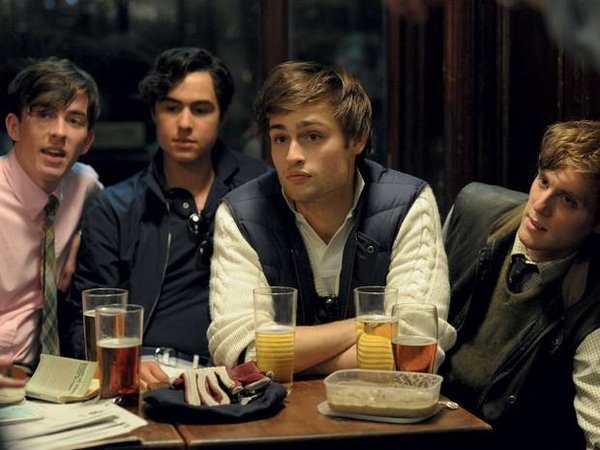It may be an exclusive rich kids club, but is The Riot Club worth chucking money at?…
Two fresh-faced Oxford students are brought into the The Riot Club, a secretive organisation of only ten members that has been operating for centuries. An annual club dinner starts to get out of hand when drinks, politics and a hatred for the poor are mixed.
We’ve seen rich kid stories before, but director Lone Scherfig and writer Laura Wade do what is hardest: dropping the viewer into a rich kid bubble. You’re transported to the fun, rollicking adventures of young men who discard their own Aston Martin’s, live off impressive lineage and play expensive and/or disgusting pranks on each other. Yes it’s a little ridiculous, but you’re quickly absorbed into first world problem dramas that are significant and convincing plot events. When an arguably insignificant food is missed at a banquet the men are seriously distressed and tensions rise without appearing absurd. Only when they look down at normal folk do you awake from this slumber of ‘awkward comfort’ to find the nastiness of each individual; an awakening that is a hard hit.
The film also pushes the extremes of the club in a violent and controversial direction. But the pleasures of a few violent individuals only isolate the other boys, as more reasonable folk, and lessen the power of the message that the rich inherit the earth.
The violent hot headed characters are the villains whereas the more cool and collected of the group remain largely unscathed by the film. Earlier scenes of the young men preaching their importance and belittling normal folk prove more effective. It’s said that the boys have one last chance to be reckless and party before they sit behind very big desks and it’s this subtle point that strikes the deepest. It’s made clear through their attitudes that these men aren’t by default deserving of their future responsibility when so many others may be better suited to the tasks.
An effort has also been made to represent these men in a diverse manner. A few are weedy impressionistic schoolboys, one is a playboy and another is an aspiring businessman. Laura Wade’s original theatre production may be to thank for this, and the decent spread of characters isn’t dissimilar in its group function to The History Boys. The normal folk however are displayed as rather two dimensional. Two men are shown, both poor in comparison to the men, one an Oxford student who seems level headed but not much more than that, and another who went to university but is now a waitress. She acts more as a generic female and symbol than anything else. The Riot Club tries to hard to make a valid point between the rich and poor but it seems the poor have been given a back seat in every avenue.
Wade’s screenplay carries a great deal of potential and some great tense moments, but where The History Boys discussed issues, The Riot Club is too eager to substitute meaning for physical tension and thrills.
Author – Matt, Cardiff store







